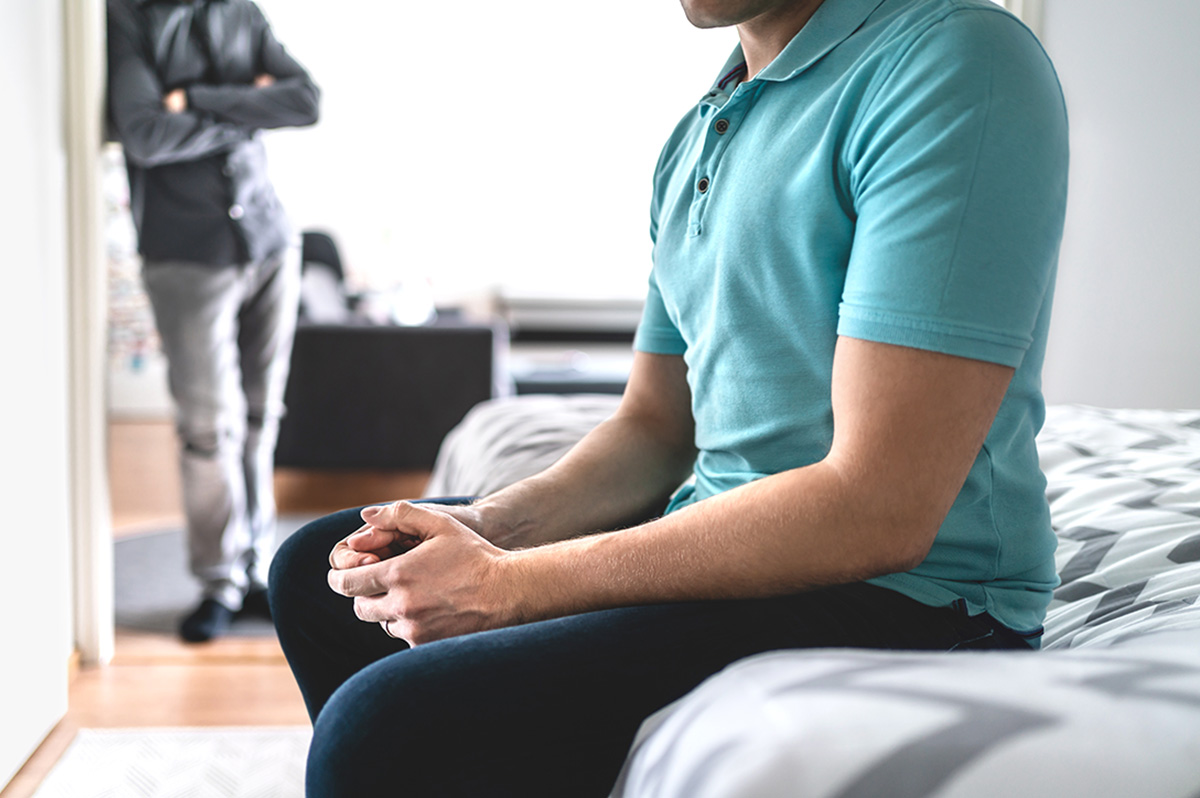Advice
The risk factor
Opening a relationship may seem like a win-win, but beware the unexpected


If you are determined to fist and your partner isn’t interested and he does not want to open the relationship, you are indeed facing a dealbreaker issue. (Photo by Bigstock)
Michael,
Your recent advice to the fisting top whose boyfriend wasn’t interested left me with mixed feelings.
On one hand, I like your drawing a line between saying, “This is important to me” as a way to make a request of your partner versus “you are obligated to participate.” But your seeming to lay down an ultimatum of “if your partner isn’t willing to join you, you have to either do without or end the relationship” perplexed me.
What about trying to negotiate an arrangement like “we’re an exclusive couple, except you can go to fisting parties every month or so, with the following ground rules”?
This might not be a workable solution for everybody — it does require a lot of time, communication and trust — but I’d hate to see an otherwise rewarding relationship fail because the parties didn’t have the tools or skills to think outside the box with regard to negotiation. Fisting is a fairly niche activity (and one that’s incredibly low-risk for a knowledgeable and responsible top) that there’s a world of difference between “I want to do this activity in a way we can both be OK with, which might involve casual outside partners” and “let’s go crazy and have an open relationship.”
Michael replies:
If you are determined to fist and your partner isn’t interested and he does not want to open the relationship, you are indeed facing a dealbreaker issue. If he does agree to your fisting other people, then of course you can go for it. But be aware that you might run into some hazards. Here are three big ones that people who open their relationships frequently encounter:
First, no matter how casual the sex you are having outside of your relationship or how unconnected you plan to be with outside sex partners, you may get interested in guys other than your boyfriend. It’s usually exciting to have sex in ways that you don’t have it at home and new sex partners are often a big turn-on. The result: sex with your long-term guy may start to seem bland, leading your thoughts and fantasies elsewhere. Where might that take you?
Second, although it may seem logical to both you and your partner that he shouldn’t feel threatened or jealous of your having sex with other people, especially if you are pursuing some sort of sexual activity that he doesn’t want to engage in with you, he may still ultimately get upset. Our feelings aren’t logical and if you’re spending time hooking up with others, your partner may wind up feeling hurt and angry, no matter what your agreement.
Third, even if you set limits on how often you are having outside sex, you’re still going to be putting energy and excitement into encounters with other guys rather than into life with your partner. This is usually not a recipe for maintaining a hot sex life or a strong relationship at home.
I get your point that a person in this situation might have a limited interaction with the guys he’s fisting, but it’s also true that fisting — just like negotiating with one’s primary partner — requires time, communication and trust, three main ingredients of bonding. So you may wind up developing a powerful bond with one of these guys. And then what?
Opening your relationship can seem like a fantastic way to have great sex that you aren’t having with your partner. But no matter how many rules you have in place, outside sex may put your relationship in a vulnerable spot. Before making such a move, I suggest you discuss two questions with your partner: Is hot sex with someone else worth the risk? And can we have sex with other people while still nurturing and strengthening our relationship?
Finally, keep in mind that no matter how much planning or thinking you do beforehand, you can’t know in advance how things will turn out.
Michael Radkowsky, Psy.D. is a licensed psychologist who works with gay couples and individuals in D.C. He can be found online at personalgrowthzone.com. All identifying information has been changed for reasons of confidentiality. Have a question? Send it to [email protected].
Advice
Stop haranguing your husband about how you think he should behave
Make your point and then move on from the argument

Michael,
My husband is great, but he’s a pushover. It happens at work a lot. For example: His colleague, who came back from maternity leave about four months ago, is always leaving early. And Jeremy is always staying late to finish the jobs that they should be doing together.
But the most galling to me is that he doesn’t speak up for himself in his family. His parents (in my opinion) overtly favor his brother (who is straight) and his brother’s family. I could give a lot of examples. The latest: They’re treating the brother and the family to a cruise.
We’ve been together for 15 years, married for 12, and never get any such treatment.
Jeremy says his brother is strapped for cash (four kids, one income) and the family needs a break, whereas Jeremy doesn’t need his parents to pay for his (or our) vacation. I don’t really want to go on a cruise but it’s the principle of the thing.
Again, this is just one example. I feel bad for Jeremy being walked on, over and over, and I want him to start standing up for himself. Despite my repeated entreaties, he won’t.
When I push him on this, he tells me I’m not seeing the whole picture, or he sees it differently, or it’s not a big deal, or he’s fine with things as they are.
I can’t see how he could be fine with being taken advantage of, or not being appreciated. I think he’d have a much better life if he actually set some boundaries with people.
How do I persuade Jeremy to listen to me and be more assertive?
Michael replies:
Do you see the irony in complaining that you can’t get your husband to listen to you about being more assertive and setting a boundary?
You’ve made your point to Jeremy, repeatedly, and Jeremy is telling you to back off. In other words, he’s assertively setting a boundary with you.
You can’t get someone else to behave in the way you want, even when you’re certain that your way is best. Jeremy gets to decide how he wants to conduct himself.
Here’s a pattern I have noticed over and over again through my years of working with couples: When you try to do something for someone that is their own job to do, both you and the person you are trying to “help” wind up being resentful. You get annoyed that the other person won’t listen to your wonderful advice, and the other person gets annoyed because they don’t want someone else telling them what to do or how to live their life.
In this case, you’re trying to get Jeremy to stand up for himself more than he does, and he’s not interested in changing how he operates.
A great rule for relationships: You can advocate for what you want, but you have to let go of the result. (And advocate sparingly, or you risk being a nag).
You are continuing to argue the same point to Jeremy, and Jeremy isn’t interested in listening to you. As you asked for my advice, here it is: Cut it out before he gets into the resentment stage, if he’s not already there, as you apparently are.
Also, please consider that your repeatedly criticizing Jeremy’s parents where Jeremy sees no problem could damage not only your relationship with Jeremy, but also his and your relationship with his family.
We get to marry the person we marry. We don’t get to insist that they upgrade to a better (at least in our opinion) version. Trying to do so is not just disrespectful and a waste of time, it poisons the relationship.
So find a way to live with Jeremy as he is, or — if you find his acquiescent nature unbearable — leave. But don’t spend the rest of your marriage, or even another day, haranguing him about how you think he should behave.
Michael Radkowsky, Psy.D. is a licensed psychologist who works with couples and individuals in D.C. He can be found online at michaelradkowsky.com. All identifying information has been changed for reasons of confidentiality. Have a question? Send it to [email protected].
Advice
I make more money than my partner and getting resentful
She’s taking advantage of a joint credit card

Hi Michael,
I make a fair amount more money than my girlfriend does and I’m happy to contribute more to our life (we are both in our 20s and living together).
But Meg doesn’t seem to care how much money she spends and then asks me to front her when she’s running low. She seldom pays me back.
Last week she had a big night on the town with her best friend (formerly her girlfriend) for the friend’s 30th birthday. She hired a limo and spent a lot on drinks and dinner. She put the entire night on our joint card which we are only supposed to use for shared household expenses, because she had maxed out her own card. Of course I will wind up paying for it. (And I am slightly jealous. Why am I paying for her evening out with her former GF?)
I pay for all sorts of stuff all the time because her credit card gets too big for her budget.
And somehow I almost never end up getting her share of the rent, which is already prorated according to our incomes.
She always tells me she’ll pay me back but her tab pretty much just keeps getting bigger.
If I bring this up with her, she tells me I am cheap because I make a lot and we’re a couple; and if she made more, she’d have no problem sharing everything with me.
Am I just being ungenerous? I don’t know. Sometimes I think she’s an ingrate, but then I think if you’re in love, you shouldn’t be thinking of money, just taking care of the person you love.
Also, although I make more than she does, I’m by no means rich. I have my own student loans, and paying for the bulk of our lifestyle stretches me thin some months.
Michael replies:
For starters: Most couples must contend with some version of your struggle with Meg, because most couples have some income disparity.
Do you maintain a lifestyle that both of you can afford? That works for some relationships where the lower earner may not want to feel indebted to the partner who makes more. Other couples work out a system where they pay for expenses in proportion to their income. And in some instances, the higher earner may have a “what’s mine is yours” philosophy and the lower earner is OK with that.
What matters is that both partners come to a mutual agreement and are comfortable with the arrangement. In other words, they collaborate.
That’s not the case with you and Meg. You sound resentful, angry, and feeling like Meg is taking advantage of you.
It’s great to be generous in your relationship, but it’s also important to have a boundary when you think it’s important to have a boundary. Yet you’re continuing to subsidize Meg even when you have trouble making your own ends meet.
Important question: Have you told Meg that you’re stretched thin some months? If not, I’d be curious as to how you’ve made that decision. If so, I’d be curious as to Meg’s response.
If you don’t want to keep serving as Meg’s piggy bank, what is stopping you?
There’s a great saying in psychotherapy: If it’s hysterical, it’s historical. Meaning, our “big” actions and reactions have their roots in our history.
Think about your life history: How does it make sense that you are acting like a powerless victim?
Is not having a boundary an old and familiar dynamic for you? Were there important players in your life—for example, your parents—who insisted it was their way or the highway? Or perhaps you learned as a kid that if you ever said “no” to your friends, there’d be negative consequences?
Now ask yourself what might be keeping you stuck in a relationship of resentment. Are you re-creating an old and familiar dynamic? Sometimes we keep putting ourselves in the same miserable situation, over and over again. What’s familiar can be comfortable, even if it’s miserable; and we may be trying to get some understanding of the dynamic and some power over it, to finally get it right.
I’m just speculating here, to encourage you to think for yourself why you are staying in the dynamic you describe. You haven’t mentioned anything positive about your relationship, or about Meg.
Another possibility: I wonder if you might be so fearful of being alone that you’re willing to tolerate all sorts of treatment in order to stay in your relationship. Or perhaps you don’t think you deserve to be treated any better than this.
Again, if this is the case, where might this belief be coming from? Understanding why we are stuck in behaviors that keep us miserable can help us to get unstuck.
You have an opportunity to do something different here: Set a boundary and take power over your life. Perhaps if you did so, Meg would surprise you by shifting her stance, which would be good news if you have some good reasons to stay. Or perhaps she would not. Your challenge now is to get some sense of what’s holding you back, if you want something different for yourself. And unless you act on your own behalf, you will stay in this position.
One more point to consider, regarding Meg’s dinner date with her ex: Whether or not anything is going on, I take your jealousy as a sign that you don’t trust Meg. And without trust, you can’t have a decent relationship.
Michael Radkowsky, Psy.D. is a licensed psychologist who works with couples and individuals in D.C. He can be found online at michaelradkowsky.com. All identifying information has been changed for reasons of confidentiality. Have a question? Send it to [email protected].

Hi Michael,
When I came to D.C. for college and came out, I was idealistic about finding true love. I made gay friends at school and watched them hooking up all the time.
It seemed like the opposite of what I wanted. I dreamed of meeting “Prince Charming” and living happily ever after. I thought I would put off sex until I met my special guy.
This went on for a while until I got too horny and impatient to keep putting off sex. The boyfriend wasn’t materializing so I went online and hooked up. Actually it was a lot of fun.
Soon I was hooking up as much as any of my friends were. I kept hoping I’d still find my prince. But over time most of my energy shifted to finding guys to have sex with.
Now I’m 34. I’ve been at this a long time and I realized the other day that I don’t like my life.
I haven’t been on a real date in years but I’m hooking up multiple times a week. I’ve been with almost everyone I see on the apps whom I find attractive (where the feeling was mutual). And yes, I’ve been with a lot whom I didn’t find attractive because I was horny.
I look at myself and I think, yuk. I don’t like whom I’ve become.
I feel like I am addicted to hooking up. I just keep craving something. The release but mostly the attention, that the other person finds me hot. After I come, I feel like the whole thing was pointless, and a little disgusted with myself. Advice?
Michael replies:
You’re using hookups not just for sex, but as a way to feel good about yourself by getting positive attention from others.
But other-validation is like junk food, a sugary snack that staves off hunger for a few minutes and never really fills you up. All those guys you hook up with? The attention feels great, but as you wrote, that feeling lasts until your orgasm. And then you’re back to chasing it.
As with junk food, the other-validation you get when you hook up is a lot of empty calories. Having someone you don’t even know agree to have sex with you says nothing meaningful about your worth or even your attractiveness.
Yet another problem: If you believe that you need other-validation, you will do all sorts of self-damaging behaviors to get it—such as hookups that leave you feeling empty and disgusted. I’ve seen many people lose their self-respect in the service of getting other people’s positive attention through behaviors that violate their own integrity. Doing things that make you feel bad about yourself in an attempt to feel good about yourself is ironic, and sad.
The bottom line is that other people can’t “make” you feel good about yourself. They might give you a small temporary boost, but your self-esteem actually has to come from you. That’s why it’s called self-esteem. Once you are past a certain age, if you don’t believe that you have value, no one else can get you there. You have to validate yourself.
Let’s go big-picture for a moment: It is our parents’ job to teach us that we have value when we are little, and when that doesn’t happen, we often struggle with self-esteem throughout our lives, unless we can find a path to develop our own belief in our worth. In the meantime, we may chase other-validation in a futile attempt to fill ourselves up.
Other experiences we go through—for example, growing up gay in a hostile environment—can also do a number on how we see ourselves, and leave us grasping for affirmation from others. It takes work to get through and get past the impact of these experiences.
So how do you get better at giving yourself the validation you are seeking? There’s a great saying from the 12-step programs: If you want to have self-esteem, behave in esteemable ways.
What would it mean for you to behave in a way that you respect? Your letter provides one answer that is true for you: Stop engaging in sexual encounters that leave you disliking yourself.
Far easier said than done, right? But that doesn’t mean it’s impossible. Having gotten clarity that you don’t like the life you’ve constructed for yourself, now you actually can do something about it. Keep in mind, though, that you will face some challenges if you stop hooking up.
First: You may find it isolating and scary to stop doing something that all or most of your friends are doing. You will have to reassure yourself that you’re doing what’s right for you; that you are taking good care of yourself by choosing to avoid behaviors that leave you feeling bad; and that it’s OK to be different from “everyone else.” In other words, you are going to have to get much better at self-validation.
If you have some friends who don’t spend a lot of their time hooking up, they may be good supports for you. Some guys find camaraderie from attending a 12-step program like Sexual Compulsives Anonymous (SCA).
Second: People often use hookups (and sex) not just for sexual gratification, but to soothe anxiety, stress, depression, and other uncomfortable feelings. If you stop hooking up, you will likely need some other ways to keep yourself calm and to steady your mood. Exercise and meditation are two obvious means.
You’d be wise to figure out new ways to fill your time that give you a sense of meaning and connection. I can’t tell you what those might be; only you can figure out what is right for you. They might include developing or deepening warm friendships, taking good care of yourself, finding a new activity that interests you — the list can go on and on.
If you still want to find your prince, this is the way to go about it. The cliché is true: You can’t expect anyone to like you unless you like yourself. If you build a life rich in fulfilling pursuits that help you to feel good about who you are and the life you are leading, you will be transforming yourself into relationship material.
Keep in mind, though, that letting yourself get close to someone through a heart connection would mean having to confront all sorts of uncomfortable emotions, including feeling vulnerable, that you have avoided by limiting yourself to crotch attachments.
That said, working to become a more solid person would help you develop the strength to tolerate the ongoing challenges of a close relationship.
Michael Radkowsky, Psy.D. is a licensed psychologist who works with couples and individuals in D.C. He can be found online at michaelradkowsky.com. All identifying information has been changed for reasons of confidentiality. Have a question? Send it to [email protected].
-

 U.S. Supreme Court1 day ago
U.S. Supreme Court1 day agoSupreme Court to consider bans on trans athletes in school sports
-

 Out & About1 day ago
Out & About1 day agoCelebrate the Fourth of July the gay way!
-

 Maryland5 days ago
Maryland5 days agoSilver Spring holds annual Pride In The Plaza
-

 Opinions4 days ago
Opinions4 days agoSupreme Court decision on opt outs for LGBTQ books in classrooms will likely accelerate censorship












